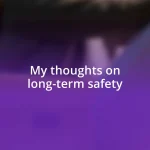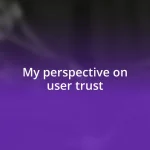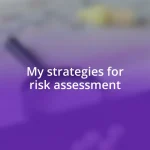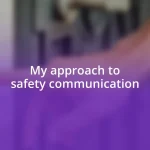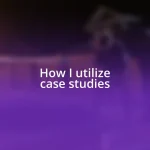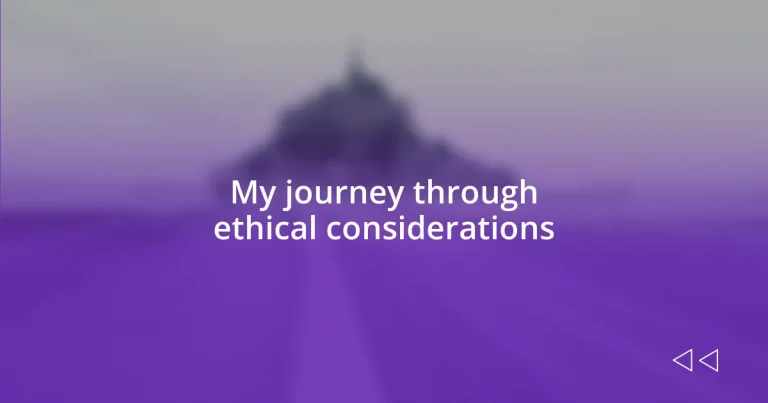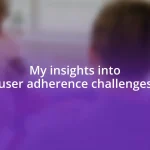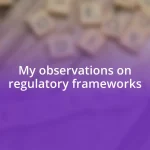Key takeaways:
- Ethical decision-making often involves navigating personal values against societal standards, requiring deep reflection on the consequences of choices.
- Using frameworks and critical questions can clarify complex dilemmas, helping align decisions with long-term principles rather than immediate gains.
- Incorporating ethics into daily practices fosters accountability and collective wisdom, enhancing team dynamics and reinforcing shared values.
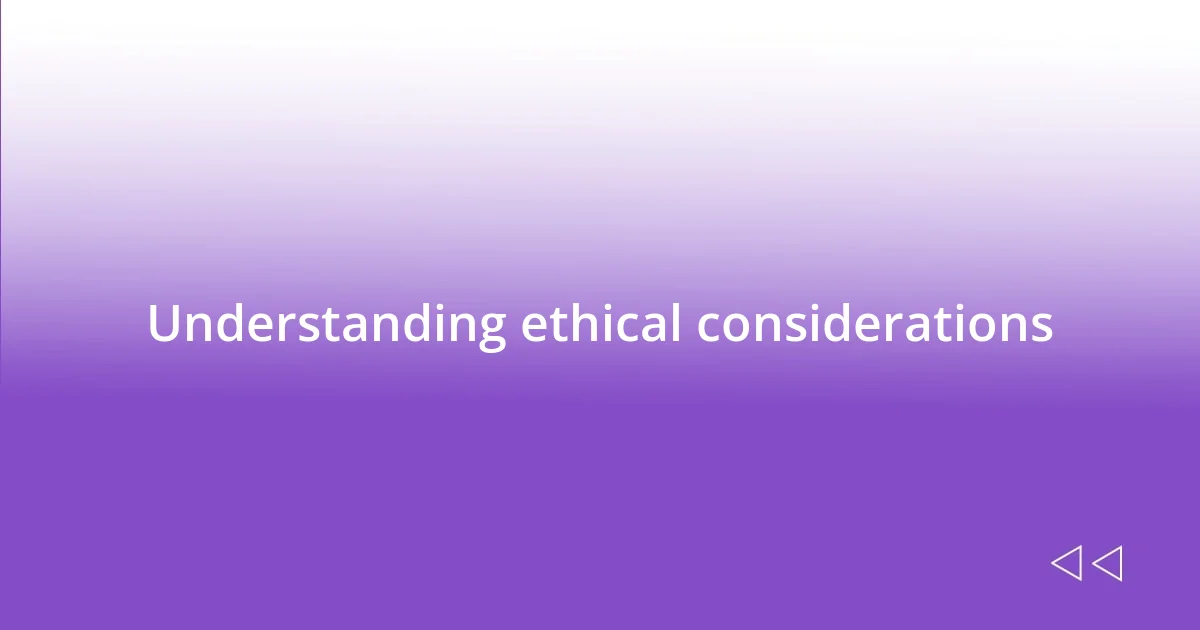
Understanding ethical considerations
Ethical considerations are fundamental to navigating the complexities of our decisions. I recall a project I worked on where we had to choose between using a more affordable material that could potentially harm the environment or investing in sustainable options. It felt like a crossroads—was saving money worth the potential harm to our planet? This dilemma forced me to reflect deeply on the consequences of my choices.
I often find myself pondering: how do we determine what is truly ethical? It’s not always clear-cut. For instance, when faced with a dilemma, I’ve learned that personal values and societal standards might clash. I once faced a situation where I had to report a coworker’s unethical behavior, which left me feeling torn between loyalty and integrity. It’s these moments that truly test our moral compass and guide us toward understanding the nuances of ethical considerations.
Sometimes I wonder if we’re too quick to label decisions as right or wrong, without fully contemplating the broader implications. During a community project aimed at improving residents’ lives, we grappled with the potential gentrification effects of our efforts. I realized that ethics often require us to engage in uncomfortable conversations about power, privilege, and responsibility. This journey through ethical considerations continuously teaches me that understanding them is an evolving process.
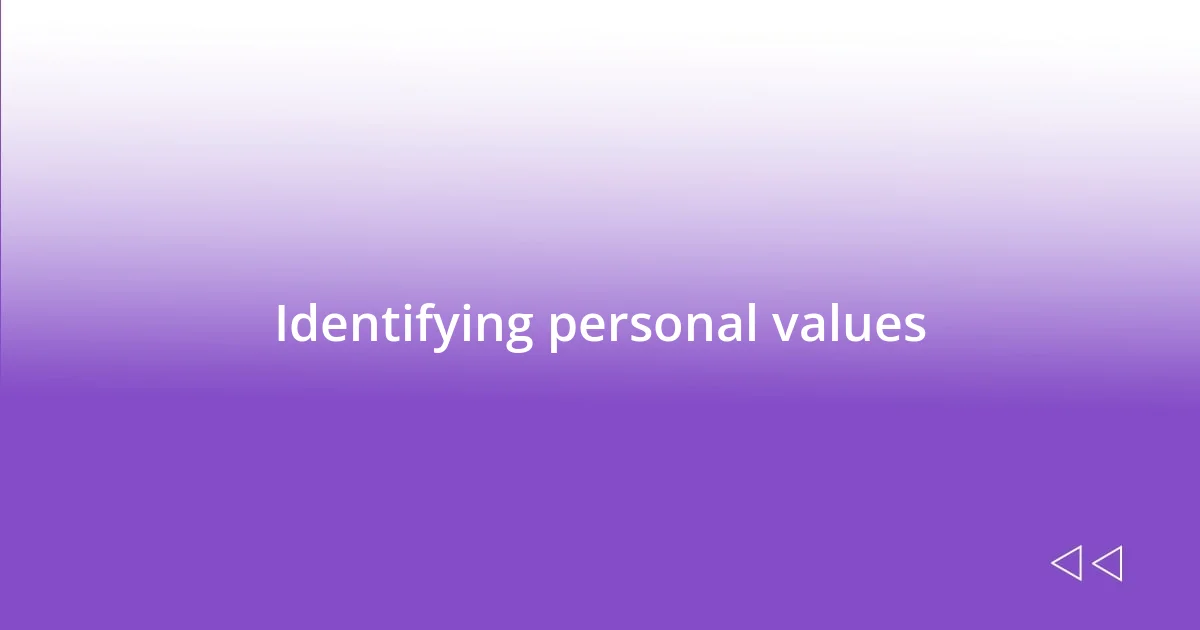
Identifying personal values
Identifying my personal values has been a transformative experience. I remember a time when I volunteered for a local organization, and we had to decide how to allocate limited resources. That situation made me reflect on what truly mattered to me: community support, transparency, and kindness. Those values became my guiding stars, helping me align my decisions with what I believed in.
To help clarify your own personal values, consider these prompts:
- Think about moments when you felt proud—what values did you uphold in those instances?
- Reflect on what angers you—often, your reactions reveal what you deeply value.
- Identify the people you admire and the qualities they possess; these can reflect your own aspirations.
- Consider experiences that resonated with you emotionally, whether they were positive or negative.
Through this introspection, I’ve learned that values aren’t just abstract ideas; they form the foundation for how I navigate the world.
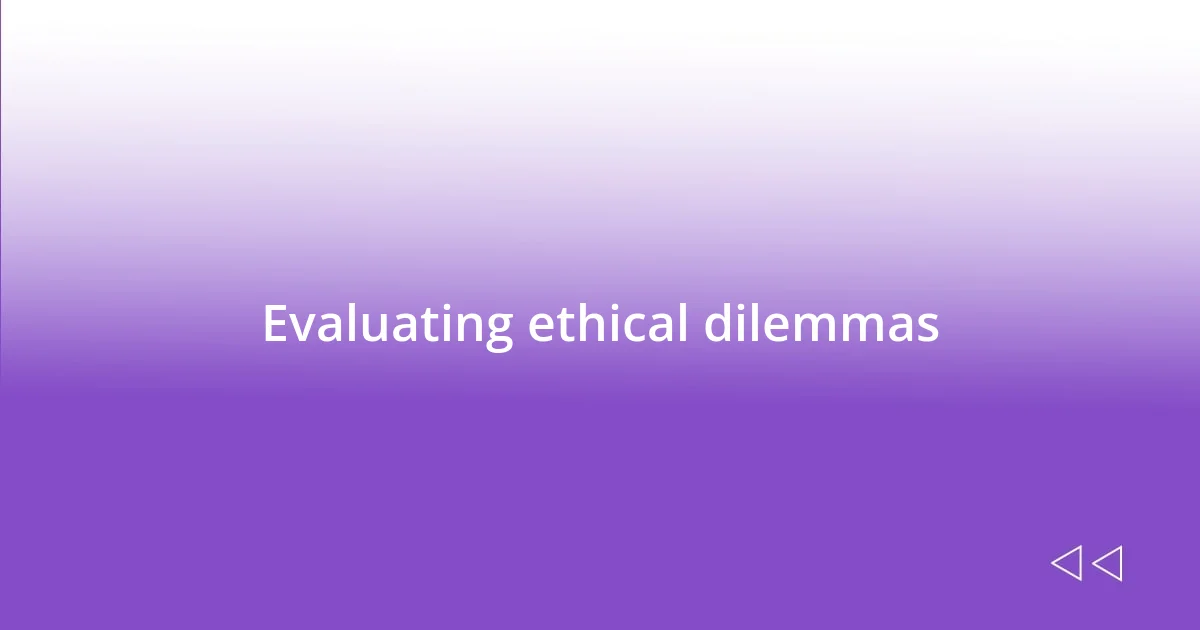
Evaluating ethical dilemmas
Evaluating ethical dilemmas can be a challenging yet enlightening process. I remember when I was tasked with deciding whether to support a marketing strategy that exaggerated product benefits. It felt uncomfortable, as I weighed potential profit against honesty. In that moment, I realized that ethical evaluations often require us to look beyond immediate gains and consider long-term reputational impacts.
It’s fascinating to see how different dilemmas can evoke a spectrum of emotions. For example, a friend once found herself in a situation where she could either help a competitor in need or focus solely on her own business. This completely tore her apart—she didn’t want to appear unsupportive but also didn’t want to jeopardize her own success. I believe such moments prompt us to evaluate our true priorities and ultimately shape our ethical perspectives.
Ultimately, when I evaluate an ethical dilemma, I ask myself critical questions: What are the potential consequences of my decision? Whom will it affect, and how? It’s like peeling back layers of an onion, revealing the deeper implications of our choices. Reflecting on these questions helps me to navigate the murky waters of ethics with greater clarity and purpose.
| Dilemma | Considerations |
|---|---|
| Supporting exaggerated marketing claims | Profit vs. Honesty, Long-term reputation |
| Helping a competitor | Support vs. Business interest, Community relationships |
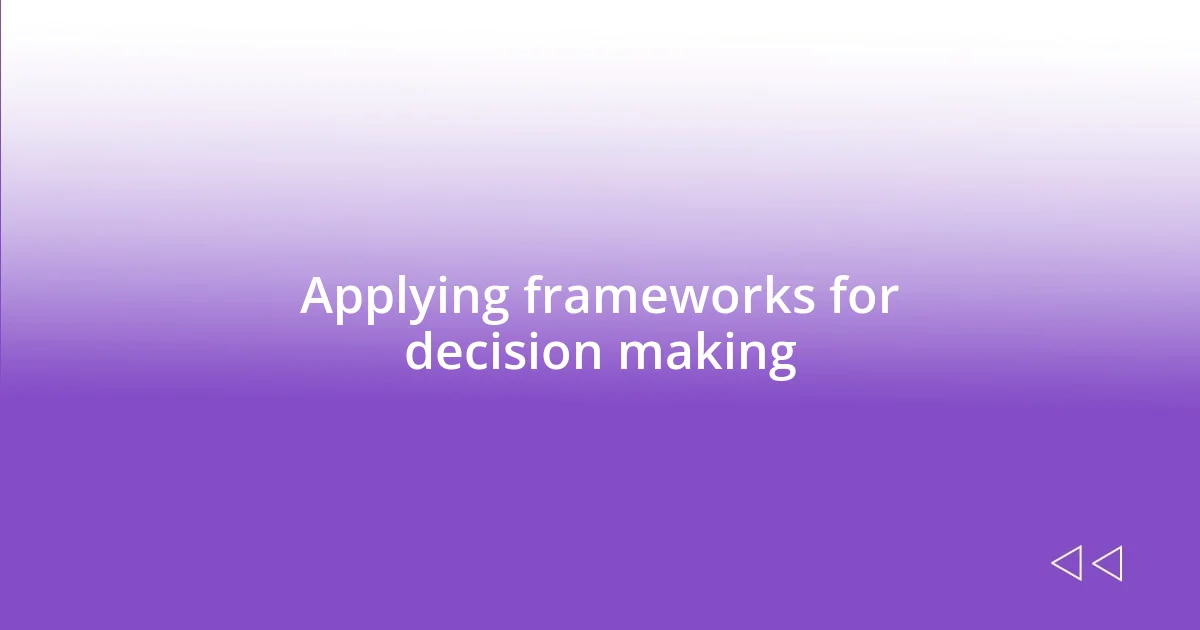
Applying frameworks for decision making
Applying frameworks for decision-making has been essential for me, especially when I encountered complex situations in my career. One time, I faced a choice between sticking to a budget and investing in a more sustainable solution for our project. I used a pros and cons framework to lay everything out—this not only clarified my thoughts but also highlighted the long-term benefits of prioritizing sustainability. Isn’t it interesting how a simple framework can shift our perspective and empower us to align our decisions with our values?
I often find myself gravitating towards the utilitarian approach, especially when team dynamics are at stake. For instance, during a team project, we had to determine whether to cut certain features to meet deadlines. I encouraged my colleagues to assess the overall impact on users, which led us to a consensus that balancing quality with deadlines was crucial. After all, how can we call ourselves ethical if the choices we make disregard the experience of those we serve?
In moments of uncertainty, I lean toward the virtue ethics framework, which focuses not just on the action but on the character it reflects. Reflecting on personal integrity has led me to crucial insights, especially during a recent decision where I had to confront a conflict of interest. I asked myself, “What kind of leader do I want to be?” That question really grounded me and illuminated the right path. When we anchor our decisions in who we aspire to be, the moral clarity often becomes much sharper.
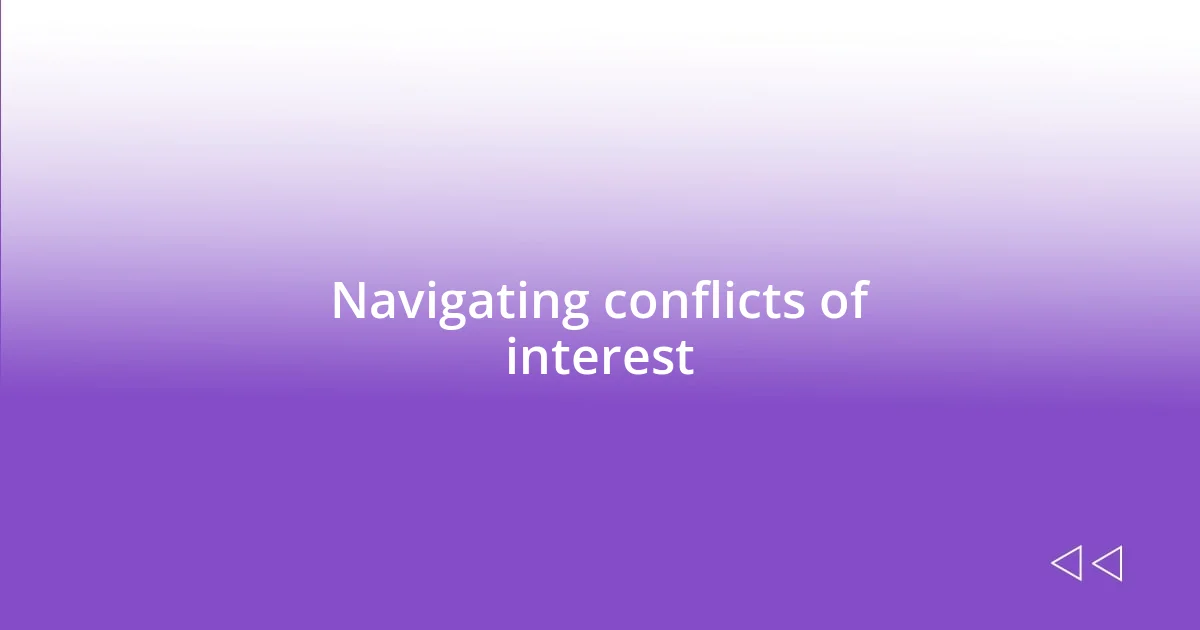
Navigating conflicts of interest
Navigating conflicts of interest can feel like walking a tightrope. I once found myself in a situation where I was asked to recommend a vendor for our project, but I had a personal relationship with one of the competitors. I remember sitting there, contemplating what my decision would mean for my integrity and my team’s trust in me. Such moments made me question: How can I balance personal loyalties with professional duties without compromising my values?
In another instance, a colleague and I were presented a lucrative offer from a client, but I sensed that our values didn’t align with theirs. I felt a knot in my stomach as we weighed the financial benefits against the potential ethical fallout. I thought, “If we take this, what message are we sending to our clients and ourselves?” Ultimately, we chose to decline, prioritizing our principles over a quick gain. It reaffirmed for me that sticking to our ethical beliefs can sometimes feel uncomfortable, but it is often the right choice for the long haul.
As I reflect on these experiences, I realize that navigating these conflicts is not just about making decisions—it’s about living in alignment with who we truly are. Each dilemma forces us to confront our values and think about the impact on our stakeholders. So, how do we ensure our choices resonate with our core beliefs? I’ve found that cultivating an open dialogue with peers and mentors often brings fresh perspectives and reinforces my commitment to ethical clarity.
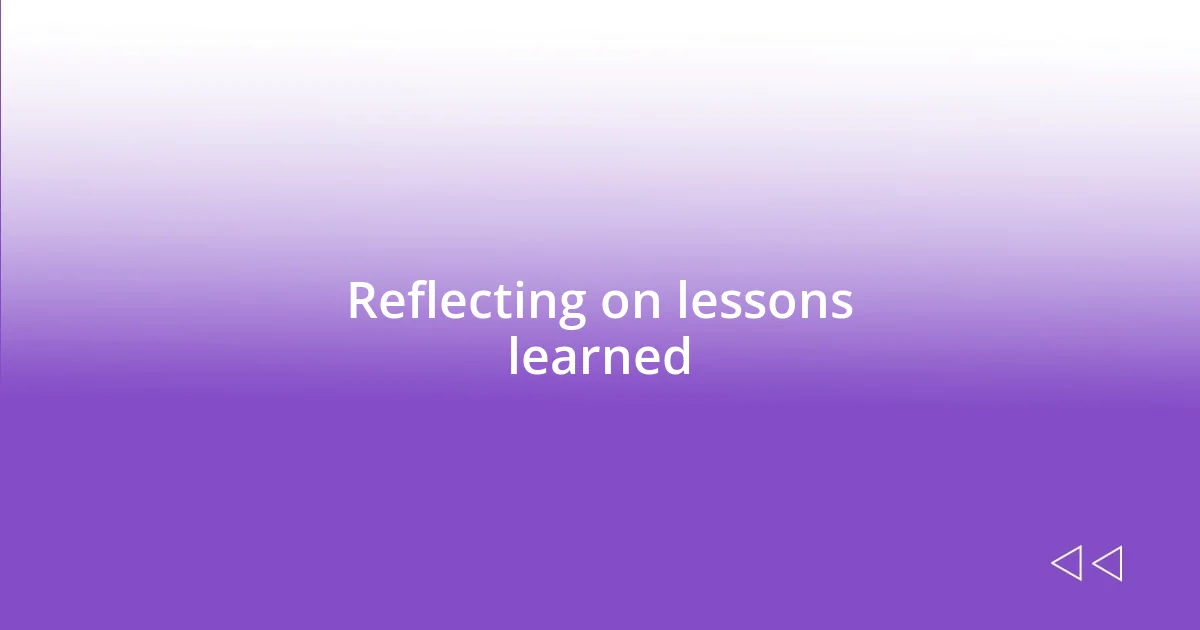
Reflecting on lessons learned
Reflecting on the lessons I’ve learned through ethical considerations has been a powerful journey. One memorable moment was when I had to decide whether to report a colleague who was bending the rules. I remember feeling torn—on one hand, I valued loyalty to my team, but on the other, I recognized the potential long-term damage to our work reputation. In the end, I chose to address the issue directly with my colleague first. This experience taught me that sometimes the most challenging decisions bring clarity, and having difficult conversations can pave the way for growth.
There’s something profound about realizing that ethical decision-making is a process, not a one-time event. For instance, I’ve discovered that revisiting past choices can reveal insights that improve future actions. After a failed project in which I didn’t advocate strongly enough for our team’s concerns, I took time to reflect on what I could have done differently. I wrote down my thoughts, and the act of articulating my feelings helped me process the disappointment and emerge more resilient. Isn’t it interesting how self-reflection can transform our experiences into stepping stones for personal development?
Ultimately, each lesson has forged a deeper connection to my values. I’ve learned to embrace discomfort when it comes to ethical dilemmas. For example, after encountering backlash for speaking up about a project’s ethical shortcomings, I sat with that discomfort long enough to realize its significance. It was uncomfortable, but it also reaffirmed my commitment to integrity. I’ve come to see these moments as opportunities for growth rather than setbacks, helping me become a more principled leader. What if we all viewed our ethical challenges as stepping stones rather than stumbling blocks? The perspective shift can be transformative.
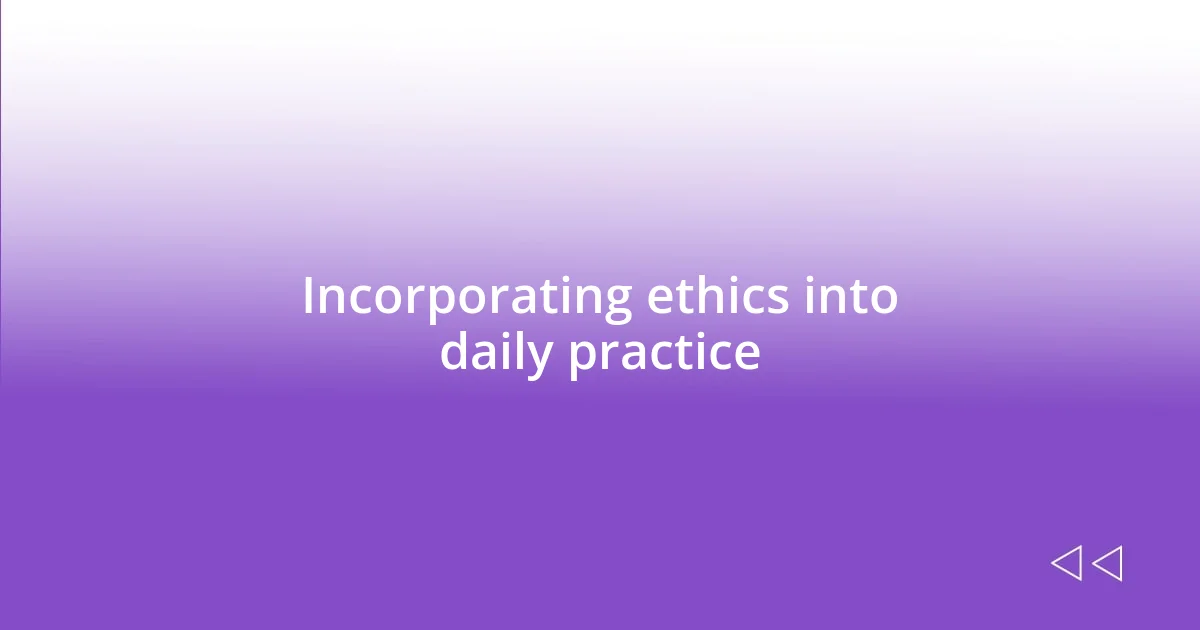
Incorporating ethics into daily practice
Incorporating ethics into my daily practice has become a crucial compass in my professional life. I remember a day when a team member proposed cutting corners to meet a tight deadline. My heart raced at the thought; I knew that while this could solve our immediate issue, it would undermine our commitment to quality. I calmly explained my perspective, highlighting how our reputation hinges on consistently delivering exemplary work. Engaging in such conversations not only reinforced our team’s values but also fostered an environment of accountability and transparency.
One of my go-to strategies is to integrate ethical considerations into my decision-making. I often pause and ask myself, “What would I want if I were on the receiving end of this choice?” Recently, I faced a dilemma involving resource allocation for a project. I felt a strong pull toward supporting a colleague who I believed needed assistance but knew our team’s resources were stretched thin. Reflecting on the potential outcomes helped me navigate this situation—acknowledging the ethical implications of favoritism versus fairness is an ongoing process that shapes my approach.
Another practice I cherish is sharing ethical dilemmas openly during team meetings. I recently brought up a past decision I questioned, seeking input from my colleagues. The dialogue that ensued was eye-opening; it revealed not just varying perspectives but also affirmed the shared values we uphold as a team. This experience made me realize that incorporating ethics isn’t a solitary task—it thrives in community and can spark meaningful discussions that lead us to better decisions. Isn’t it remarkable how seeking collective wisdom can strengthen our moral backbone?



